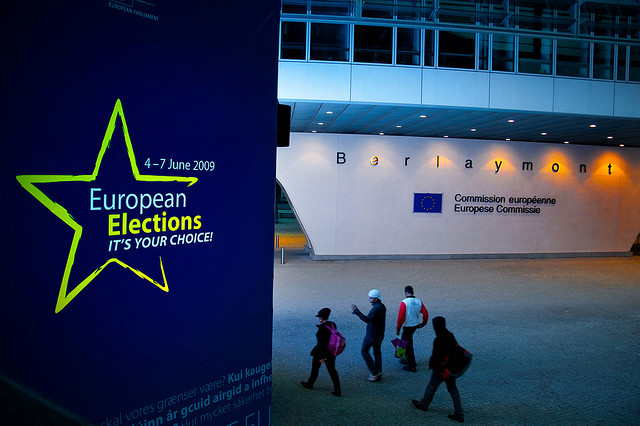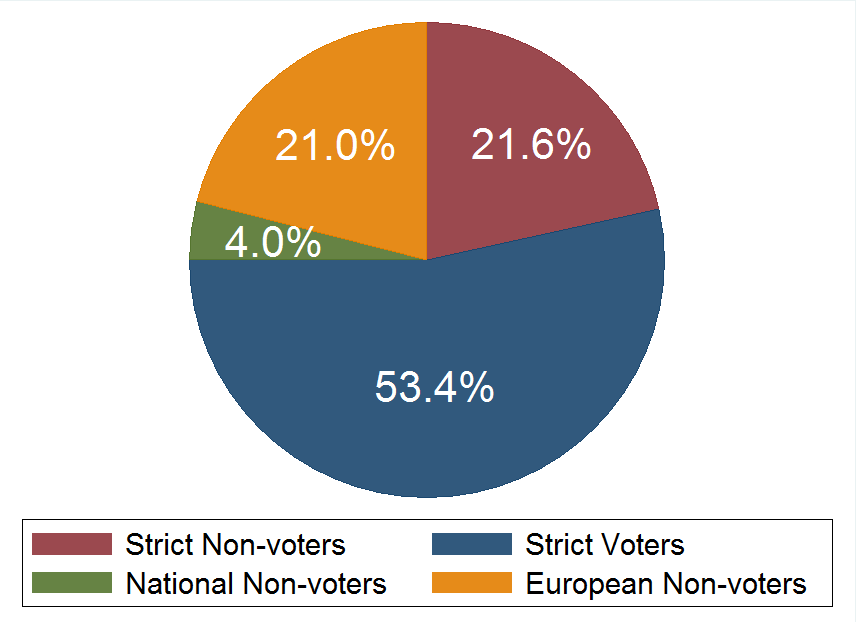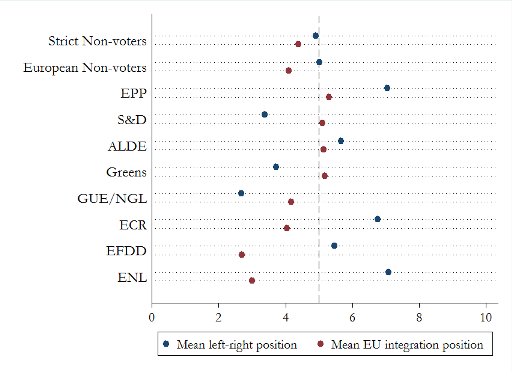If Eurosceptic parties continue to prosper European elections could hinder further European integration
Turnout in European Parliament (EP) elections once again decreased in 2014. This observation seems worrying for many scholars and practitioners regarding the EU’s democratic legitimacy. However, by analysing the characteristics and motivations of European non-voters using EU-wide post-electoral survey data, Constantin Schäfer argues that a higher turnout in European elections might not necessarily lead to more political stability in the EU.
Turnout in European elections has decreased for the seventh time in a row in 2014 (figure 1). This observation seems alarming for the EU, especially for those who see electoral participation as manifest citizen support for a political system. Scholars studying the democratic legitimacy of the EU thus increasingly try to understand the motivation of non-voters in European elections. On the one hand, abstaining has traditionally been connected to a certain distance and alienation from politics in general.
On the other hand, it seems well plausible to assume that abstainers want to express their discontent with the EU by staying away from the ballot boxes, thereby provoking a low turnout. But only few studies so far have asked whether there actually is a European element in electoral non-participation. In other words: Has the EU played any role for the decision of non-voters to abstain in the 2014 EP elections or is their abstention purely determined by the same factors that lead to non-voting in national elections, as proponents of the “second-order national elections” paradigm argue? To put it bluntly, are these non-voters rather Eurosceptic or indifferent?
Figure 1: EP elections turnout over time
In order to answer these questions, we can consult the 2014 European Election Studies (EES), a representative post-electoral survey carried out in all 28 EU member states. Here, respondents have been asked whether or not they have voted in the recent EP elections. Despite an over-reporting rate of about 15 percentage points – the reported turnout is 57,4% while the real turnout was only 42,6% – these self-reported (non-)voters provide us with some valuable insights about their characteristics. If we distinguish between those abstainers that have at least voted in the last national elections (“European non-voters”) and those who have not even done that (“strict non-voters”), we can see that their share is almost equal amongst all non-voters (figure 2). The size of both groups thus seems big enough to further investigate differences in their motivation to abstain.
Figure 2: Types of self-reported voters and non-voters in the 2014 EP elections
First of all, it is necessary to disregard all those abstainers who abstained purely due to personal circumstances. The reason is that these involuntary non-voters, for example those who were sick on the election day, do not tell us much about the motivation of those who have actively stayed home for a reason. As we can see in figure 3, the European non-voters report significantly more EU-related reasons for their abstention than strict non-voters who actually indicate significantly more other (broadly) political reasons. Both observations show that it indeed makes sense to distinguish between the two groups: On one side strict non-voters who rarely ever vote due to (broadly) political reasons and on the other side European non-voters who abstain mainly in EP elections, rather because of EU-related political reasons.
Figure 3: Self-reported abstention reasons of strict and European non-voters
In order to further understand both groups of non-voters and their relationship to the EU, we can compare them to different voter groups that we can identify in the 2014 European elections: Voters of “pro-EU parties” (EPP, S&D, ALDE, Greens-EFA), “soft Eurosceptic parties” (ECR, GUE-NGL) and “hard Eurosceptic parties” (EFDD, ENL). To put it differently, we can ask which voter groups our both non-voter groups are most similar to. Figure 4 shows where non-voters place themselves on the two main policy dimensions of EU politics. First, while all the other voter groups indicate distinct positions on the left-right axis that fit to their electoral choices, non-voters seem to be rather non-ideological, as they place themselves on average directly on the central position. Secondly, non-voters prove to be rather Eurosceptic, as they are on average rather against than in favour of further European integration. In this regard, they appear to be most similar to voters of soft-Eurosceptic parties. Interestingly, the European non-voters are even less in favour of more integration than strict non-voters, which underlines their Eurosceptic motivation to abstain.
Figure 4: Non-voters and voter groups on main policy dimensions
Lastly, comparing non-voters to voters regarding several socio-psychological dispositions that usually serve to explain (non-)participation in politics yields some more interesting results. In figure 5 we can see that strict non-voters are the ones who are by far least interested in politics, least exposed to media coverage of elections, least affiliated to a particular party, least cognitively mobilised, and feel least capable to change something in politics. In contrast, the European non-voters show similar tendencies, but are generally closer to voters in these psychological characteristics. In fact, their level of EU support, political efficacy and political knowledge, for example, let them appear very much like Eurosceptic voters.
Figure 5: Non-voters and voter groups on central socio-psychological dispositions
Summing up we can conclude that the question “Eurosceptic or indifferent?” cannot be answered univocally, mainly because non-voters in European elections show both motives. They are on the one hand slightly Eurosceptic, similar to voters of (soft) Eurosceptic parties. On the other hand, they are rather non-ideological and marked by a certain distance to politics in general which makes them very special amongst the European citizenry. However, by distinguishing between those non-voters that rarely ever vote and those who deliberately choose to abstain in EP elections due to their stance on European integration, we can see a certain European element in electoral non-participation.
The “European non-voters” participate in national elections but abstain in European elections, partly because of lacking interest and involvement in politics, but also because they seem to express their discontent with the current state of European integration by staying home during European elections. In this regard, they disprove the pure “second-order national elections” hypothesis.
Last but not least, scholars and practitioners who argue that a higher turnout in EP elections would automatically revive the legitimacy of the EU’s political project should be warned. Bringing largely Eurosceptic and indifferent non-voters to the ballot boxes could prove to be counterproductive for this aim.
Not only would their vote be less informed which makes them easy targets of populists, but there is also a good chance that they vote for Eurosceptic parties in order to express their critical stance on European integration. In that case, stimulating a higher turnout in EP elections could eventually lead to an even lesser degree of stability in the European Union and an even greater barrier for a continued European integration process.
—
Note: this post represents the views of the author, and not those of Democratic Audit or the LSE. Please read our comments policy before posting.
—
 Constantin Schäfer is a PhD student at the Graduate School of Economic and Social Sciences Mannheim and a Research Associate at the Chair of Comparative Government, University of Mannheim. His research centers on Euroscepticism, Public Opinion and Voting Behaviour. His academic profile can be found here.
Constantin Schäfer is a PhD student at the Graduate School of Economic and Social Sciences Mannheim and a Research Associate at the Chair of Comparative Government, University of Mannheim. His research centers on Euroscepticism, Public Opinion and Voting Behaviour. His academic profile can be found here.











 Democratic Audit's core funding is provided by the Joseph Rowntree Charitable Trust. Additional funding is provided by the London School of Economics.
Democratic Audit's core funding is provided by the Joseph Rowntree Charitable Trust. Additional funding is provided by the London School of Economics.
If #Eurosceptic parties continue to prosper European elections could actually hinder further European integration https://t.co/PGlJJCZDJM
If Eurosceptic parties continue to prosper European elections could hinder further European integration https://t.co/iz5Apj5z1A
According to this piece, higher turnout in EU elections might not necessarily lead to more political stability in EU https://t.co/OVYU86CBLq
If Eurosceptic parties continue to prosper, European elections could hinder further European integration https://t.co/yvbHL1TrmZ
If Eurosceptic parties continue to prosper, European elections could hinder further… https://t.co/GhzKor7wpU https://t.co/4BXs9raGDh